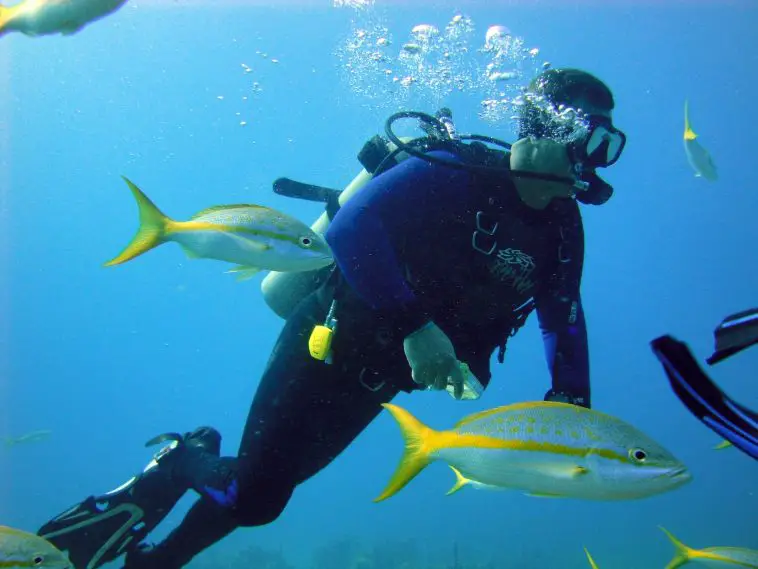Underwater welding is a demanding, yet rewarding profession. It’s the perfect choice for those who love to work in the water and are looking for an exciting way to make a living. But how long can you expect to stay in this line of work? In this article, we’ll discuss what factors affect the life expectancy of an underwater welder and why it may be worth considering as a career option.
Page Contents
What is Underwater Welding
Underwater welding is a process that requires specialized skills and equipment to join two or more pieces of metal underwater. It’s one of the most challenging and in-demand jobs within the welding industry, as it takes years of practice and dedication to master this skill. The job consists of cutting, shaping, and joining metals together in order to repair boats, ships, oil rigs, pipelines, dams etc., all from beneath the surface of water.
The welders must be certified divers before they can start underwater welding training courses. A welder needs to obtain specific skills related to safety protocols for working at sea level depths as well as their knowledge on how different atmospheric pressure affects certain materials when submerged below water levels. The process involves using very complicated machinery such as an electric arc cutter which utilizes a high current electric arc between an electrode holder connected with cables that are operated by generators onshore or aboard vessels. This tool heats up the metal until it’s ready for fusion with other parts that have been pre-cut earlier during preparation work done above water level prior to diving down into position for joining the components together through heat generated from electrical energy passing between them.
The environment underwater makes it difficult for welders due its cold temperature combined with tight spaces full of oxygen bubbles created by machines used during welding processes further adding onto difficulty levels faced when attempting these tasks successfully without any mistakes being made while also maintaining safety standards required throughout entire operation procedures each time before exiting out safely afterwards once finished with projects assigned ahead beforehand thoroughly planned out in advance accordingly beforehand depending upon situation specified accordingly based off complexity requirements involved per individual case basis scenarios appropriately met along way every single time without fail each go around always no exceptions ever allowed whatsoever none whatsoever period end story bottom line conclusion absolutely no doubt about it zero room left over remaining extra space leftover margin area nothing like that none at all zilch nada nil zip complete empty void spot always guaranteed forevermore guarantee policy promise officially signed sealed delivered finally realsed put into effect effective immediately applicable universally applicable globally accepted acknowledged widely known across board unanimously agreed upon terms conditions peace deal settled quite nicely indeed thanks much appreciate highly grateful appreciate deeply thank you kindly sincerely truly surely forever amen sure thing yessir yup definitely yes indeedy doodah daydream believer so be it giveth then taketh away kind regards best wishes blessings prosperity luck fortune health wealth happiness long life love joy peace contentment serenity harmony balance blissful pleasure satisfaction delight heavenly euphoria pure pleasure extreme enjoyment delightful exuberance never ending ecstasy beautiful elation grandiose jubilation marvellous wonderful ecstatic ebullience incredible energizing enthusiasm divine rapture matchless exhilaration incomparable vivacity sheer joy inexpressible bliss extraordinary gaiety remarkable liveliness celestial joviality
Roles and Responsibilities of Underwater Welding
Underwater welding is a highly specialized skill that can be both physically and mentally demanding. It involves the use of advanced tools and techniques to weld, cut, or join metal together while submerged in water. As an underwater welder you will need to have excellent physical strength, endurance and dexterity as well as knowledge of electrical wiring and metallurgy.
In this role, your primary responsibility is to ensure that work is done safely, efficiently and accurately by using the right tools for the job in the most appropriate way possible. You must also be familiar with all safety protocols related to working under pressure at great depths for long periods of time. This could include understanding decompression procedures or learning how to operate specialized equipment such as a robotic arm used for welding in deep waters. Additionally, you must prepare materials prior to each job including setting up torches and cutting machines along with any other necessary supplies needed before beginning a project underwater.
It’s important that you are able communicate clearly with your team members when discussing projects so everyone understands their roles onsite during each task; this helps reduce errors which may lead to costly mistakes later on down the line if not addressed early enough. Furthermore it’s essential that all welding tasks are completed according industry regulations ensuring quality control standards are met throughout every stage of production process – from preparation through completion – while keeping costs low without compromising on safety measures put into place beforehand.
Challenges and Safety Considerations of Underwater Welding
Underwater welding is a unique and thrilling profession that requires an expert operator. It involves extreme conditions, including working at depths of up to 300 feet below the surface of the water and withstanding intense pressure from above. The diver must be highly trained and certified in order to complete his or her job safely.
The challenges and safety considerations associated with underwater welding are vast and complex. To start, divers must be trained in safe diving practices such as proper air management, buoyancy control, equalization techniques for deep dives, monitoring their health during long dives, minimizing decompression time after surfacing from a dive, etc. Furthermore, additional precautions need to be taken when performing welding tasks underwater due to the potential hazards of electric shock or fire caused by sparks created during welding operations. These dangers can be minimized by using appropriate protective gear such as dry suits (to prevent hypothermia) insulated gloves (for electrical protection), flame-resistant clothing (to protect against burns), eye protection (against glare) and helmet shields (from falling debris). Additionally, divers should work in pairs if possible so they can monitor each other’s safety while on duty – if one person runs into trouble there will always be someone else present who can come to their aid quickly!
In general terms some key challenges/safety considerations associated with underwater welders include:
• Proper air management
• Equalization techniques for deep dives
• Monitoring health during long dives
• Minimizing decompression time after resurfacing
• Using appropriate protective gear e.g dry suit/insulated gloves etc • Working in pairs
What is the life expectancy of an Underwater Welder?
Life expectancy for an underwater welder is a difficult question to answer, as it depends on the individual and their particular set of circumstances. However, in general terms, most underwater welders can expect to enjoy a successful career lasting around 15-20 years before they retire or move on to another profession.
Underwater welding has been practiced since the early 1900s and is considered one of the most dangerous jobs out there due to its hazardous environment. Underwater welders have to work in very deep waters with little protection from extreme temperatures, high pressure environments and potentially hazardous creatures such as sharks or jellyfish. These factors put them at risk of sudden injury or death, which is why safety standards are so important when performing this job.
Despite these risks, many people choose this field as a career because it offers great rewards both financially and emotionally; not only do you get paid well but you also get the satisfaction that comes from working in an exciting and challenging environment. With proper training and equipment experience under their belt, those who pursue this profession can look forward to long careers doing meaningful work that benefits society.
Employment Opportunities in Underwater Welding
Underwater welding is an exciting, unique career field that provides individuals with the opportunity to work in a variety of settings and make a living doing something they love. Working underwater offers its own set of challenges and rewards, but it also presents numerous employment opportunities for those willing to take on the job.
The primary function of underwater welders is to provide maintenance and repairs on submerged objects such as pipelines, ships’ hulls, offshore rigs and other structures. Underwater welders must possess technical knowledge and experience related to welding processes as well as diving skills to safely perform their duties in high-pressure environments. Aspiring welders should be certified through an accredited program before attempting any type of underwater welding job. Certification ensures safety standards are met while providing employers with assurance that workers have been properly trained for the task at hand.
Working in this profession often requires long hours under sometimes extreme conditions; however, there are many benefits associated with becoming an underwater welder such as higher wages than most jobs offer due to the specialized nature of the work, health insurance coverage provided by employers if working full-time or part-time positions available through contracting companies looking for skilled professionals on short notice. Moreover, some countries even offer incentives like tax breaks or subsidized housing expenses when taking up permanent residence near a particular project site – making this line of work highly attractive for those seeking adventure or travel abroad!
Health Effects of Long-Term Exposure to Water Pressure
The effects of long-term exposure to high water pressure can be both physical and mental. While some people may have no ill effect from submerging themselves in a pressurized environment for extended periods of time, others report feeling changes in their bodies and minds.
Physical effects may include increased fatigue, dizziness or vertigo, headaches and joint pain. Over time these symptoms can become more intense as the body adapts to the higher levels of pressure underwater. Additionally, there is evidence that prolonged exposure to compressed air increases nitrogen retention in the body which could lead to decompression sickness also known as “the bends” if one ascends too quickly after being submerged for an extended period.
Mentally, long-term exposure to high pressure environments has been linked with feelings of disorientation and confusion along with difficulty focusing on tasks or comprehending new information effectively. In severe cases depression and anxiety have been reported by divers who spend too much time underwater without proper recovery periods between dives. For this reason it is important for those who frequently dive or are exposed to water pressures over a long period of time take extra care when planning out their dive schedule so they don’t overexert themselves mentally or physically while diving
Benefits of Becoming an Underwater Welder
Being an underwater welder is a unique profession that promises both intellectual and financial rewards. It requires a combination of technical knowledge and physical strength, making it the perfect job for someone who likes to challenge themselves in every aspect. In addition to the satisfaction that comes from mastering this specialized field, there are several other benefits associated with becoming an underwater welder:
Financially Rewarding: Underwater welders can expect generous compensation rates due to their high level of expertise and skill set required. Many employers offer competitive salaries as well as bonuses or incentive programs based on performance. Additionally, most underwater welding projects involve working away from home which may entitle workers to travel allowances and per diems depending on the company’s policies.
Variety & Challenge: Every dive has its own set of challenges so no two jobs will ever be exactly alike; whether it’s dealing with changing conditions such as currents or visibility levels or even figuring out how best to utilize available tools – each day presents new opportunities for learning and problem-solving skills development. Even after years in the field, professional underwater welders never stop growing as they continue challenging themselves and pushing past boundaries while improving their craftsmanship over time.
– Generous salary packages
– Opportunity for career growth
– Variety & challenge in every project undertaken
– Chance to develop technical & problem solving skills
– Potential travel allowances & per diems
Wrapping it Up!
In conclusion, underwater welding is a specialized field with unique roles and responsibilities. It presents both challenges and safety considerations that must be taken into account before pursuing this line of work. An underwater welder can expect to have a long-term career as there are many opportunities for employment in the industry. However, it is important to take into consideration the health effects of long-term exposure to water pressure when deciding whether or not becoming an underwater welder is right for you. Ultimately, pursuing this type of work can bring about great rewards in terms of job satisfaction and financial security.
what is the life expectancy of an underwater welder
Frequently Asked Questions!
The average life expectancy of an underwater welder depends on the individual’s physical health and exposure to hazardous conditions. Generally, a healthy and experienced underwater welder can expect to have a longer life expectancy than one who is less physically fit or has fewer years of experience in their profession.
What Are The Safety Requirements For Underwater Welders?
To work safely as an underwater welder, it is essential for workers to receive proper training and certification from a qualified institution. In addition, all welders should wear appropriate protective clothing when working in wet environments, including helmets with face shields and insulated boots. Furthermore, additional safety precautions must be taken when welding near gas lines or other pressurized systems.
Are There Any Health Risks Involved With Underwater Welding?
Working as an underwater welder can involve potential risks such as decompression sickness (DCS) due to long periods spent at deep depths; heat exhaustion from the hot temperatures encountered while welding; eye irritation caused by sparks flying off nearby surfaces; ear damage caused by loud noises associated with cutting tools; muscle strain resulting from heavy lifting activities required during some jobs; possible contact with toxic materials present in some water bodies; and contact with dangerous electrical currents if not properly protected against them.
What Qualifications Do I Need To Become An Underwater Welder?
In order to become an underwater welder you must first acquire specialized welding skills through formal education programs or apprenticeships offered by certified institutions. Additionally, candidates may need certifications issued by professional organizations that demonstrate technical knowledge regarding the use of specific equipment necessary for the job. Finally, having advanced diver certifications will provide invaluable skills when working at great depths below sea level which are often required for most positions available in this field of work.
Is It Possible To Earn A Good Salary As An Underwater Welder?
Underwater welders typically enjoy generous salaries depending on their expertise level coupled with the type of projects they are assigned too which can range greatly according to geographic location or company affiliation rates among other factors related to the industry itself . Therefore there is potential for earning very competitive wages within this line of work especially given its relatively limited size market worldwide compared to many other professions out there today..




